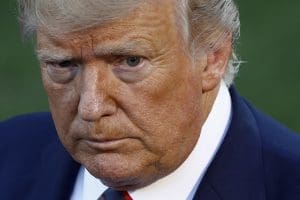Federal court rules hotel and restaurant owners can sue Trump over unfair competition
Trump will face a lawsuit over his ‘vast, complicated, and secret’ business interests.

A lawsuit by restaurant workers and a prominent restaurateur and hotelier who say Donald Trump has business conflicts that violate the Constitution was restored Friday by a federal appeals court after a judge on a lower court dismissed it.
A three-judge panel of the 2nd U.S. Circuit Court of Appeals in Manhattan, on a 2-1 vote, rejected a judge’s finding that the plaintiffs did not have standing to sue. At issue is the little-known domestic and foreign emoluments clause of the U.S. Constitution.
The appeals court noted that the plaintiffs, including owners of high-end hotels and restaurants in New York City and Washington, say they are harmed by competing with Trump’s businesses over the exact same customer base when customers know that giving business to Trump’s establishments might secure his favor in governmental decisions.
It said the lower-court judge effectively insisted that the plaintiffs prove the facts necessary to win at trial before they had a chance to gather all of them.
Trump has made appearances at his resorts, golf clubs and a hotel in Washington frequently since he was sworn in as president in January 2017.
In a dissent, Circuit Judge John M. Walker Jr. said the plaintiffs were invoking constitutional provisions never directly litigated in over two centuries prior to the Trump presidency.
He called the case “deeply political” and said it was an area “where federal courts ought to tread lightly.”
“President Trump was democratically elected by the American people — and he was elected with his business holdings and brand prominence in full view,” Walker wrote.
The majority opinion, written by Circuit Judge Pierre N. Leval, took issue with Walker’s observations, saying that legal challenges under the Constitution’s Emoluments Clause may be “fueled in part by political motivations” but it is hard to ascertain the significance of that fact.
The majority said whether a lawsuit has political motivations is irrelevant to legal issues to be considered when a lawsuit is tossed out.
The Justice Department declined to comment.
Trump has called the lawsuit “totally without merit.”
The lawsuit alleged Trump’s “vast, complicated, and secret” business interests were creating conflicts of interest.
Justice Department lawyers had argued that the plaintiffs did not suffer in any way and thus had no standing to sue.
The ruling came on a day that Trump’s son Donald Trump Jr. told Fox News Channel’s “Fox & Friends” that claims that his father was using his office to benefit his businesses were “ridiculous.”
“I mean first of all, he’s not involved at all with those things. They also neglect to talk about the fact that we voluntarily stopped doing any international deals. I mean, just think of the opportunity costs,” he said. “You’ve seen where the emoluments and suits have gone. They’re just trying. The amount of incoming, you know, he’s taken.”
Citizens for Responsibility and Ethics in Washington first filed the lawsuit. It was later joined by Restaurant Opportunities Centers United Inc. and two individuals in the hotel industry.
Recommended

Ted Cruz’s wildfire relief reversal sparks accusations of hypocrisy
Cruz voted against a 2021 effort to help farmers impacted by wildfires
By Jesse Valentine - May 10, 2024
SC governor to sign bill banning hormone therapy for transgender youth into law
Treatments for youth already taking the drugs could be gradually taken off them through Jan. 31
By Skylar Laird, South Carolina Daily Gazette - May 09, 2024
Republican Sam Brown’s assault on teacher unions could backfire
Brown has called for abolishing the U.S. Department of Education.
By Jesse Valentine - May 09, 2024









































































